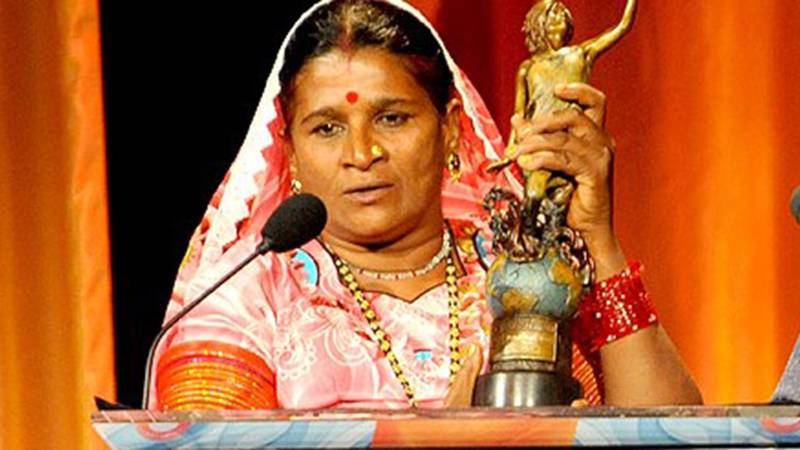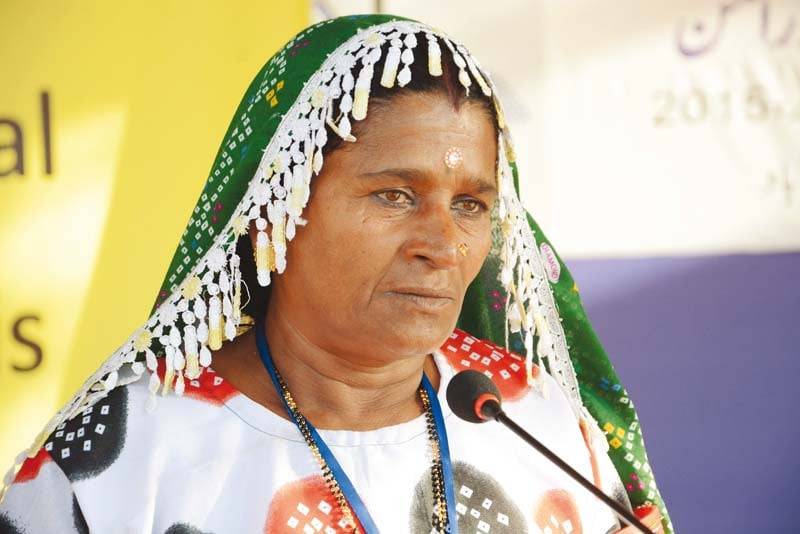
“Bury me standing; I’ve been on my knees all my life”
(Isabel Fonseca, The Gypsies and their Journey)
The day thousands of cricket lovers at Mumbai’s Wankhede stadium were left stunned on India’s champion batsman Virat Kohli’s dismissal, just 12 runs short of his 49th ODI ton, a small number of people comprising, among others, of the disciples of Mumba Devi – the deity in whose honour the city is named after – in Judho town of Sindh province were no less shocked as they were preparing to bury Veeru Kohli-a former bonded labourer and a champion of human rights in Sindh. Terming her death as the ultimate freedom, writer Rumana Hussain remarked: “25 years of working tirelessly to free bonded laborers in Sindh, and she herself once a bonded labourer, is now free from all forms of bondages,” “Ms. Kohli’s struggle inspired scores of labour rights activists not only in Pakistan, but also abroad” the Human Rights Commission of Pakistan (HRCP) tweeted on the demise of 2009 Frederick Douglas freedom award recipient Veeru Kohli.
She died in her two-room clay hut at Azad Nagar – a locality housing freed bonded labourers of the province near Hyderabad.
After escaping a bonded labour camp in 1998, she devoted her life for the cause and helped liberate nearly 4,000 Haris and brick kiln workers who were hostage at bonded labour camps across the province. With her death at the age of 60, the voiceless haris and other oppressed people of Sindh have truly lost a saviour that they had found after Shakil Pathan – the coordinator of the HRCP Special Task Force that busted hundreds of feudal lords’ private prisons and freed thousands of bonded labourers in the 1990s. In fact, Veeru Kohli and her family’s release from one such private jail was Pathan’s last endeavour before his untimely death in a road accident near Umerkot in September 1998. By carrying the torch short after his death, Veeru Kohli rightly extended Pathan’s legacy of a ‘long walk to freedom’ for the marginalised and oppressed.
The Kohlis are the largest minority group and leading agricultural workforce of the province. Historically, a died-in-the-wool rebel community, they have been made docile and all too often addicted to the local liquor that they themselves make (popularly called Tharro or Kohli Whisky) by cruel landlords through their bonded labour establishments. In one of his beautiful verses, late Sindhi poet Hassan Dars portrays Kohlis as people who after working the whole day in the fields under the landlords’ frowning eyes, gather around the tavern when dusk falls and lay aside their neck-chains of slavery by opening large earthen vessels of Tharro.
But Veeru Kohli dared to opt for a less trodden path and recalled her indigenous rebel instincts when her landlord at Umerkot did not allow her to marry her daughters off. “In 1998 we were all set for our daughters’ wedding, our landlord Suleman Bhatti physically assaulted me and my son Pirbhu as he was ‘interested’ in my daughters. Scared of more woeful consequences, my son went missing the night he was maltreated by landlord. While wandering pole to pillar in searching him, I reached Mariam camp – a makeshift arrangement for freed bonded labourers at Matli town of Badin district.” Veeru once narrated the story: “From there, I got connected to Shakeel Pathan, who helped me to file a petition in the court and I got a verdict in my favour after two months. I stood barefoot for three days in front of SSP Umerkot’s office, holding the Court order. After that I got 45 members of my family and relatives released from the private prison of a landlord. I met them after almost three months,” she added with teary eyes.
Instead of enjoying a life of liberty, Veeru devoted the rest of her life to abolishing bonded labour. The valiant Veeru fearlessly ventured into bonded labour camps of some powerful feudal lords of northern Sindh and helped free those who were destined to be chained to slavery for ages. “She actually focused more on the implementation aspect of court orders issued for the release of bonded labourers,” says Fehmida Jarwar, a Hyderabad-based journalist. “It has become quite easy to get a court order now, but the actual problem is the nexus between feudals and police, which hinders true implementation of verdict. Either the police show reluctance or the landlords do not allow the freed labourers to take along their animals or whatever precious belongings they have, which leaves them in more misery even after getting liberty.” Jarwar recalls Veeru told her during one of her many interactions.
She used to help freed families to start a new life in whatever ways that she could. “In Hindu traditions, removing of bangles is a sign of widowhood, but Veeru once removed her silver bangles and gave them to a needy family to get some rations,” Jarwar adds.

In her later years, she had become what prominent writer and rights activist Amar Sindhu terms “an iconic figure.” In 2006, noted Indian activist Nirmala Deshpande invited her to India, to speak at World Social Forum. In 2009, Veeru went to Loss Angeles to receive the prestigious Frederick Douglass Freedom Award, which she won among more than 500 candidates of 26 countries. In the 2013 general elections, she contested against the PPP heavyweight Sharjeel Memon and got more than 5,000 votes.
Ironically, among all the Hindu minority communities, the Kohlis are the people whose women most prominently work shoulder-to-shoulder with their male partners, but this has not helped them to make their lives better, owing to the highly exploitative nature of their work – bonded labour. Veeru Kohli, throughout her life, strived to jettison this mould by actively challenging stereotypes and labels thrust upon women in particular and her community in general. Rest in power, Comrade Veeru Kohli! You did a commendable job.

